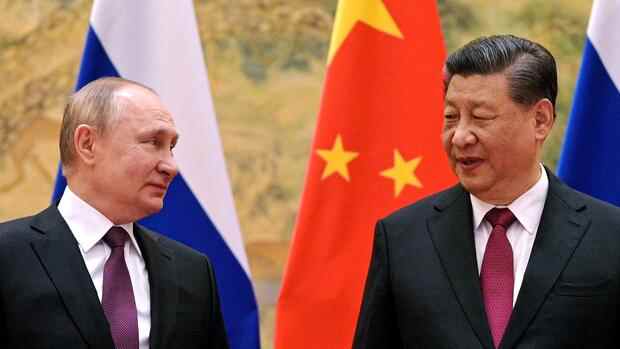Berlin Almost nine billion dollars. Even today, when board members of international companies hear this number, a chill runs down their spines. That’s how much the major French bank BNP Paribas paid in 2014 for circumventing US financial sanctions on Iran, Sudan and Cuba.
Since then, banks and companies around the world have been living with the threat of so-called secondary sanctions whenever the USA imposes punitive measures against other countries for political reasons. It is no different in the case of Russia. The USA put sanctioned banks, companies and government agencies on the list of the so-called Special Designated Nationals (SDN list). With secondary sanctions, Washington could then also take aggressive action against those who do business with the entities on the list.
How sensitive the topic is could be seen in the exchange of blows between China and the USA in the past few days. First, the US National Security Adviser, Jake Sullivan, threatened the Chinese with “serious consequences” if they undermined the US sanctions imposed on Russia or even provided military aid to Moscow.
In response, Chinese Foreign Minister Wang Yi asserted that China was not involved in the war in Ukraine “and does not want the sanctions to affect China”. Should the US nevertheless take action against Chinese companies, Wang announced retaliatory measures.
Top jobs of the day
Find the best jobs now and
be notified by email.
The Europeans have already bitten their teeth at the extraterritorial effects of US sanctions. Because Brussels did not want to fully support the sanctions imposed by Washington against Iran, attempts were made to offer European companies detours in order to avoid Uncle Sam’s long arm.
The project was largely unsuccessful, and for many companies the risk was simply too great. In the case of Russia, the Americans and Europeans are pulling together, although the EU has not yet threatened any secondary sanctions. However, companies from China, India, Turkey and some Gulf states could be targeted by American economic warriors.
“In many companies there is considerable uncertainty about the extent of the secondary consequences of sanctions, also on reputational risk,” said Felix Helmstädter from the international law firm Morrison & Foerster at an information event. This is mainly due to the United States’ “Foreign Direct Product Rule” (FDPR), which is one of the most powerful weapons in the American arsenal.
Activists stand on the balcony of Russian oligarch Deripaska’s town home in Belgrave Square. Russian oligarch Deripaska, who has a stake in energy and metals company En+ Group, is one of seven Russian oligarchs sanctioned by the UK government.
(Photo: dpa)
These product rules are intended to prevent goods manufactured with American technology or know-how from falling into the hands of sanctioned states, companies or individuals, even if these goods are produced by non-American companies. For example, FDPR was used to block the Chinese telecom supplier Huawei from accessing global chip suppliers.
China is still the focus of American attention because of its close relationship with Russia. US Commerce Secretary Gina Raimondo recently threatened to cut off Chinese companies from American equipment and software if they evaded sanctions against Russia.
US export controls against Russia and Belarus prohibit the sale of certain high-tech products, such as sophisticated computer chips. Raimondo is particularly targeting Semiconductor Manufacturing International Corp. (SMIC) in Shanghai.
“The effects of the new controls would be minimal if other countries didn’t follow suit,” emphasizes Martin Chorzempa from the Peterson Institute for International Economics (PIIE) in Washington. For the first time since the Cold War, a grand coalition of countries is coordinating with Washington to introduce similar controls on cutting-edge technologies. And that doesn’t just put Chinese companies between the fronts. The US hopes that their threat of secondary sanctions alone will have enough of a deterrent effect.
Anticipatory obedience in companies
And, as in the case of Iran before, it seems to be working this time too. “Many companies opt for anticipatory obedience,” said the commercial lawyer of a large law firm, who wished to remain anonymous. Brazil is a good example of this. The country has not officially participated in the sanctions against Russia. Nevertheless, the Brazilian aircraft manufacturer Embraer is “voluntarily” taking part: “We have stopped the delivery of spare parts, maintenance and technical support for customers in Russia, Belarus and parts of Ukraine affected by the sanctions,” said company boss Francisco Gomes Neto.
Even with US allies like Taiwan, the companies are unsettled. “We quickly assembled a team to study economic sanctions and US export laws,” James Hwang, chairman of Taiwan tech supplier Getac, told Japanese news outlet Nikkei Asia. The wording of the US sanctions is often kept vague in order to build up maximum pressure. According to Nikkei, the Taiwanese MSI, the largest manufacturer of gaming PCs in Russia, is said to have followed the example of the US chip manufacturers Intel and AMD out of caution and stopped selling their products in Russia.
The heads of government in India and Turkey are far less cautious than the companies. Indian Prime Minister Narenda Modi wants to buy oil from Russia at discount prices despite a US embargo. And the Turkish head of state Recep Tayyip Erdogan is said to have offered the Russian President Vladimir Putin, according to Turkish media reports, to settle the trade in rubles or Chinese yuan.
More: Lavrov on negotiations: We almost agree on some formulations – Kyiv demands binding security guarantees.
